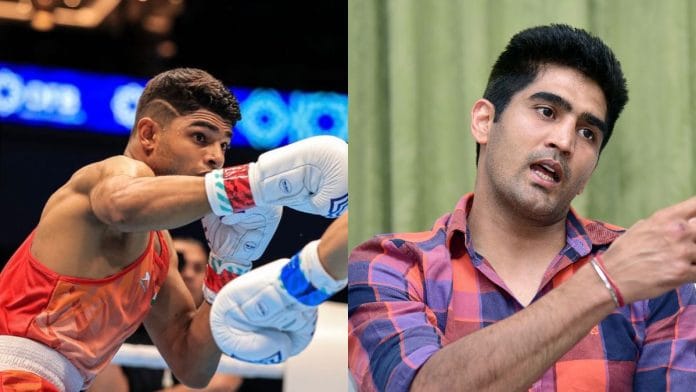New Delhi: Boxer-turned politician and 2008 Olympics bronze medallist Vijender Singh has voiced his support for boxer Nishant Dev, who suffered a disputed loss at the Paris Olympics, and said that he strongly believes that Dev outperformed his opponent.
“Nishant was confident, aggressive and a clear winner of the first round of the bout. He continued his dominance in the second round, with a competitive third round. He was the better boxer, but the decision was given against him, which I’m still in disbelief about,” Singh told ThePrint.
Dev’s loss in the quarterfinals of the Men’s 71 kg category has sparked controversy and a debate on the fairness of the scoring system. Although Dev seemed to dominate in the initial rounds, the judges’ scorecards at the end of the bout did not reflect it. He lost to Mexico’s opponent Marco Verde in a 1-4 split verdict.
In a post on X after the match, Singh had called the bout a “very close fight”.
I don’t know what’s the scoring system but I think very close fight..he play so well..koi na bhai #NishantDev
— Vijender Singh (@boxervijender) August 3, 2024
In a telephone conversation with ThePrint, Singh spoke about the row, the scepticism around the scoring system, potential biases in boxing and possible ways to enhance the transparency of judgements.
“This has happened before and will continue to happen. But now, we see that people are using social media to raise their concerns over such judgements. It has happened at the last three Olympics that I’ve witnessed closely or have been at,” Singh said. “I remember, even at the 2000 Sydney Olympics, I watched Gurcharan paaji’s (Gurcharan Singh) bout very closely. The decision was slightly biased. But now times have changed and we can raise our concerns.”
Singh suggested that if the Boxing Federation of India and Dev remain dissatisfied with the outcome, they should formally lodge a protest with the Olympic committee.
He recalled a 2012 incident, where Indian boxer Vikas Krishan had initially defeated US’s Errol Spence 13-11, only for the American team to successfully appeal against the decision. The authorities had subsequently overturned the result, declaring Spence the winner with a 15-13 verdict, five hours after the bout had concluded.
Singh shared his insights on the subjective element involved in the process of judgement, which, he said, can lead to inconsistencies.
In boxing, judgements are typically made by a panel of judges, who score bouts based on factors like clean punches, defence and ring generalship. Each judge’s scorecard is then combined to determine the winner.
However, subjective assessment can sometimes lead to disputed outcomes, raising concerns about biases and impartiality.
Singh said, “Boxing is simple. The one with the more clear punches wins the bout. In my time, clear punches got you points, and efforts were made to disclose the points and make the process of judgement more transparent. But still, we see some sort of inaccuracy at times.”
Asked about the need to incorporate technology in the scoring and assessment process in boxing, he said, “Technology should definitely be used to make the game fairer and more transparent for everyone involved.”
He, however, suggested a hybrid approach, combining modern technology with “old school” elements. He told ThePrint, “I would like to propose that judgements are made how they were back in my time… Our totals reached 48-50 towards the end, and now boxers get 4-5 points. They have to ensure boxing becomes more interesting.”
On Dev’s performance, he said, “He has a long way ahead of him. He should keep working hard. Rabb sab dekhda hai (God watches everything). He will get a chance to prove himself again.”
Heartbroken after the defeat denied him a podium finish, Dev took to Instagram to express his disappointment. In a post, he wrote, “Nobody truly knows how hard I worked, the countless hours I dedicated to manifesting this dream, and the honesty and truthfulness I poured into my training… And in one cruel moment, it was all taken away from me.”
He added, “Hearing the judges’ scores, it felt as though there was nothing left in my body — The pain was so intense that I felt I just couldn’t take it. I may have missed out on a medal but I have gained a renewed sense of purpose. My journey doesn’t end here; it begins anew. I will train harder, fight smarter, and come back fiercer.”
(Edited by Mannat Chugh)






